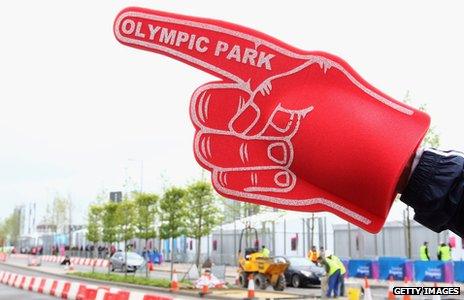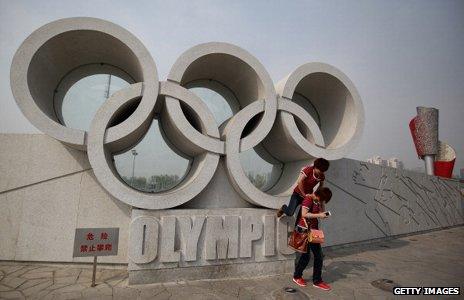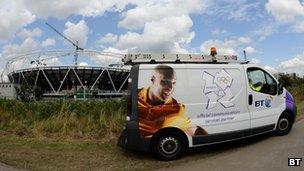Will my mobile phone work during the Olympic Games?
- Published

This year's Olympic Games will see huge amounts of data being streamed across networks, say analysts
It is the men's 100m final at the Olympics, and your seat is in prime position. But just as you want to share a video or picture, just as you send that tweet, you realise you no longer have internet connectivity - or phone connection, for that matter. All networks are severely overloaded.
This is the scenario 2012 Games organisers are desperately trying to avoid.
Millions of people are expected to flock to London during the Games, armed with smartphones and tablets to stream live content, call and text family and friends, share photos and videos, or just watch the events online.
It will put a huge strain on the UK's mobile phone and internet networks.
And it does not just affect the lucky ticket holders. Everybody in London is likely to feel the network overload, including emergency services and transport operators.
Analysts estimate this year's Olympics will be the most data-heavy yet - with some 60Gb, the equivalent of 3,000 photographs, travelling across the network in the Olympic Park every second.
"The volumes are going to be phenomenal, particularly at key events, and then there will be a second wave of data when everybody starts discussing the results," says Gavin Johns from Epitero, a network analysis company.
To ensure good connectivity, BT, the official communication services provider for London 2012, has been trying to prepare the networks.
A BT representative told BBC News the company "is delivering a single communications network across 94 locations, including 34 competition venues, [and our] aim is to protect its customer experience during the Games".
"We have been talking to our customers - including communications providers and internet service providers - to model expected network demand for broadband, as the Games will be an extraordinary event," the representative added.
"We have done a huge amount of capacity-planning work, which has included reviewing and learning from events like the World Cup, royal wedding and America's Super Bowl.
"As a result we've built a capacity model for our core broadband networks and we've brought forward investment and capacity increases to meet the anticipated extra demand."
As BT does not have a mobile network, inside the Olympic Park it has partnered with Telefonica, operating in the UK under the name O2, and other mobile network providers, to create the Joint Operators Olympic Group (Joog).
Derek McManus, from O2, told BBC News: "As an industry, we have been planning for over two years, and O2 alone has invested £50m in London 2012 - increasing capacity on the current network and building new temporary sites across the country".
Previous Olympics, most recently in Beijing, China, left many visitors frustrated about the lack of internet connectivity.

London 2012 is aiming to have network capacity four times that of the Beijing Olympics
"Network performance for calling in Beijing was fine, but there was no public wi-fi in the stadiums," says Ben Smith, a Paralympic volunteer.
"Services were all 2G / Edge [slow network standards] only, so even with the poor mobile-phone camera I had then, I didn't bother posting pictures of the opening ceremony's amazing torch-lighting - it was too slow anyway."
According to BT, the network capacity at London 2012 will be four times that of the Beijing Games.
And to increase the amount of data capacity at the Olympic venues, the Joog held a trial at Twickenham Stadium, with a rugby crowd of about 80,000 people.
Before, there was mobile coverage in each quarter of the stadium. But when they used a new technique called super-sectorising - which cut the venue, like a cake, into 48 "slices", each sporting an antenna - the quality of coverage improved drastically.
The Joog has applied the model to the Olympics, increasing the number of antennas and "slices" even further.
To cope with the number of extra visitors to London during the Games, BT has been busy placing additional wi-fi hot spots around the capital.
There will more than 500,000 hot spots, it says, mostly in the centre, which should make life easier for visitors from abroad keen to save on their roaming charges.
But there is always a possibility that something, somewhere, could go wrong.

BT has partnered with O2 and other mobile network providers
"What happens if something were to go wrong with the transport infrastructure - for instance, if there's a signal failure in central London and a key line goes down?" asks Steven Hartley, an analyst with Ovum.
"So 300,000 people have tickets to an afternoon session and they are on their way down, and another 150,000 people coming from the Games - and they all come up at the same time.
"If they come up near a hot spot, all is fine.
"But then they will disperse, and suddenly you get people in other places, and that is a concern - when they spread along two or three mobile masts, will these masts be capable of handling that concentration of traffic?"
Another problem could be an unforeseen outage, for example if somebody damages a street cable, says Mr Johns.
In London, it is only permissible to carry out any major construction work on the streets between 00:00 and 06:00.
"The window to fix any potential issue is quite narrow, so it's doubtful how much work could be done to solve that," says Mr Johns.
"Let's hope nothing goes wrong."
- Published27 July 2012
- Published21 March 2012
- Published22 February 2012
- Published29 September 2011